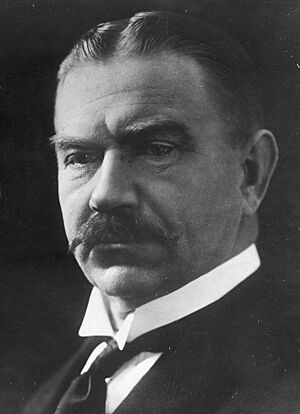Arturs Alberings facts for kids
Quick facts for kids
Arturs Alberings
|
|
|---|---|
 |
|
| 6th Prime Minister of Latvia | |
| In office 7 May 1926 – 18 December 1926 |
|
| President | Jānis Čakste |
| Preceded by | Kārlis Ulmanis |
| Succeeded by | Marģers Skujenieks |
| 8th Minister of Finance | |
| In office 10 September 1926 – 18 December 1926 |
|
| President | Jānis Čakste |
| Prime Minister | Himself |
| Preceded by | Jānis Blumbergs |
| Succeeded by | Voldemārs Bastjānis |
| 11th Minister of Agriculture | |
| In office 1 December 1928 – 5 March 1930 |
|
| Prime Minister | Hugo Celmiņš |
| Preceded by | Vilis Gulbis |
| Succeeded by | Vilis Gulbis |
| In office 27 March 1931 – 5 December 1931 |
|
| Prime Minister | Kārlis Ulmanis |
| Preceded by | Vilis Gulbis |
| Succeeded by | Vilis Gulbis |
| Personal details | |
| Born | 8 January 1877 Rūjiena Parish, Kreis Wolmar, Livonia, Russian Empire |
| Died | 26 June 1934 (aged 57) Riga, Latvia |
| Nationality | Latvian |
| Political party | Latvian Farmers' Union |
| Spouse | Magda Kermann Albering |
| Awards | Order of the Three Stars Order of the White Rose |
Arturs Alberings (born January 8, 1876 – died April 26, 1934) was an important Latvian politician. He served as the 6th Prime Minister of Latvia for a short time in 1926.
Contents
Early Life and Education
Arturs Alberings was born on January 8, 1876, in a farming family in Rūjiena, which was then part of the Russian Empire. He went to Vilkene Primary School and Kharkiv Agricultural High School. He also studied agronomy (the science of soil and crop production) in Norway. He even learned about fish farming in Germany.
Later, he worked in Russia as a director at an agricultural school. He also managed large farms. When he came back to Latvia, he taught classes at the Riga Central Agricultural Association. He also helped set up groups to monitor farm animals in the Rūjiena and Valmiera regions.
Start in Politics
After the February Revolution in 1917, Arturs Alberings started getting involved in politics. In August 1918, he was chosen to be a member of the Vidzeme Land Council. In November, he became a member of the People's Council of Latvia. This council was a very important group that helped Latvia become an independent country. He represented the Latvian Farmers' Union political party.
Political Career
Alberings was elected to the Constitutional Assembly of Latvia in 1922. This assembly helped create Latvia's first constitution. He worked on important committees, including those dealing with farming and national security. He was also elected to the 2nd and 3rd Saeima (Latvia's parliament).
He served as the Minister of Agriculture in the governments led by Hugo Celmiņš and Kārlis Ulmanis. This role meant he was in charge of policies related to farming and food production in Latvia.
Becoming Prime Minister
In May 1926, the government led by Kārlis Ulmanis resigned. This happened because the parliament did not approve their budget plans. After this, Arturs Alberings was asked to form his own government and became the 6th Prime Minister of Latvia.
In September of the same year, the Minister of Finance resigned. Alberings took on the extra responsibility of being the Minister of Finance himself.
End of His Term
In December, the Saeima asked Prime Minister Alberings why he had not found a new Minister of Finance. He explained that he was doing both jobs himself. However, most members of parliament were not happy with this answer. Because of this, his government resigned. He served as Prime Minister from May 7, 1926, to December 18, 1926.
Awards and Recognition
Arturs Alberings was recognized for his work and contributions to Latvia. He was awarded the Order of the Three Stars 2nd Class. This is one of Latvia's highest honors. He also received the Order of the White Rose of Finland.
Death
Arturs Alberings passed away in Riga, Latvia, on April 26, 1934. He died from pneumonia.
 | Mary Eliza Mahoney |
 | Susie King Taylor |
 | Ida Gray |
 | Eliza Ann Grier |

